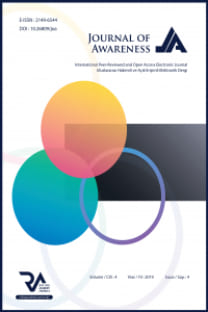LINGUISTIC FUNCTIONS OF ADVERTISING IN SEMIOTIC COMMUNICATION
advertising, communication, semiotics language functions,
___
- BARTHES, ROLAND. (1972/2001) Mythologies The Noonday Press - New York Farrar, Straus & Giroux, Thirty -seventh printing edition, New York: Hill & Wang, A Division of Farrar, Straus and Giroux.
- Barthes, ROLAND. (2002) S/Z, United Kingdom: Blackwell.
- DYER, GILLIAN. (1982) Advertisingsign as communication (Studies in culture and communication), London: Taylor & Francis e-Library.
- ECO, UMBERTO. (1976) A Theory of Semiotics (Advances in semiotics), Blumington: Indiana University Press.
- ECO, UMBERTO. (1987) The influence of Roman Jacobson on the Development of Semiotics', Classics of Semiotics-TOPICS IN CONTEMPORARY SEMIOTICS , 1st edition, New York: Springer Science+Business Media.
- FELICE, D. (2009) Analisi semiotica della pubblicità, 14 Dec, [Online], Available: http://www.comunitazione.it [1 Dec 2018].
- GODDARD, ANGELA.(2005) The Language of Advertising, 2nd edition, London: Routledge.
- HABIB, JACQUES and RENSONNET, JEAN-PHILIPPE. (1975) Le marketing du nouveau produit : stratégie de croissance, recherche et sélection de concepts, positionnement, tests et plans de lancement, Paris: Dunod.
- MARRONE, GIANFRANCO. (2008) Trupat shoqërorë, Tiranë: Botimet Dudaj.
- MEMUSHAJ, RAMI. (2006) Gjuhësi e përgjithshme, Botimi i tretë edition, Tiranë: Botimet Toena.
- PÉNINOU, GEORGES.(1972) Intelligence de la publicité: etudié sémiotique, 1st edition, Paris: Broché.
- RAYNER, PHILIP and WALL, PETER. (2009) AS media studies: the essential introduction, Third edition, London: Routledge.
- RICHARDS, BARRY. MACRURY, IAIN. BOTTERILL, JACKIE. (2013) The Dynamics of Advertising, London: Routledge.
- Schement, JORGE REINA. (2002) Encyclopedia of Communication and Information , 1st edition, New York: Macmillan Library.
- VOLLI, UGO. (2005) Manuale di semiotica, 14th edition, Roma: GLF.
- Williamson, JUDITH. (1978) Decoding Advertisements: Ideology and Meaning in Advertising, London: Boyars Publishers, Ltd., Marion.
- DURANTI, ALESSANDRO (1997) Linguistic anthropology- Cambridge Textbooks in Linguistics, Cambridge: Cambridge University Press.
- PARADEISE, CATHERINE. and LAUFER, ROMAIN. (1988). Stock Image Marketing Democracy: Public Opinion and Media Formation in Democratic Societies, Published by Transaction Publishers,
- OLLIVIER, BRUNO.(2015) Shkencat e komunikimit-Teori dhe arritje,Tiranë, Botime Papirus.
- ISSN: 2149-6544
- Başlangıç: 2016
- Yayıncı: Rating Academy
ISO 14001 YÖNETİM SİSTEMİNİN UYGULANMASINDAN KAZANILAN FAYDALAR: BİR LİTERATÜR İNCELEMESİ
İŞ SAĞLIĞI VE GÜVENLİĞİ EĞİTİMİNDE ANALİTİK HİYERARŞİ PROSESİ (AHP) MODELİ
Barış KANTOĞLU, İrem DÜZDAR ARGUN, Serkan SÖNMEZ
TÜRKİYE'DE İLLERE GÖRE HAYVANSAL VE BİTKİSEL ÜRÜNLERİN KÜMELEME ANALİZİ İLE İNCELENMESİ
Şenol ÇELİK, Turgay ŞENGÜL, Ömer ŞENGÜL, Hakan İNCİ
MERKEZİ HEKİM RANDEVU SİSTEMİNİN İŞLEYİŞİ İLE İLGİLİ MEDYAYA YANSIYAN HABERLERİN İÇERİK ANALİZİ
AKSARAY’DA UNUTULAN BİR GELENEK ‘‘DÖVME SANATI’’*
BOBİN BOYAMA KALİTESİNİN İYİLEŞTİRŞLMESİ VE İPLİK TELEFLERIİNİN AZALTILMASI ÜZERİNE BİR ARAŞTIRMA
GASTRONOMİDEKİ UMUT: BİR SOSYAL GİRİŞİMCİLİK ÖRNEĞİ OLARAK HAYATA SARIL LOKANTASI
